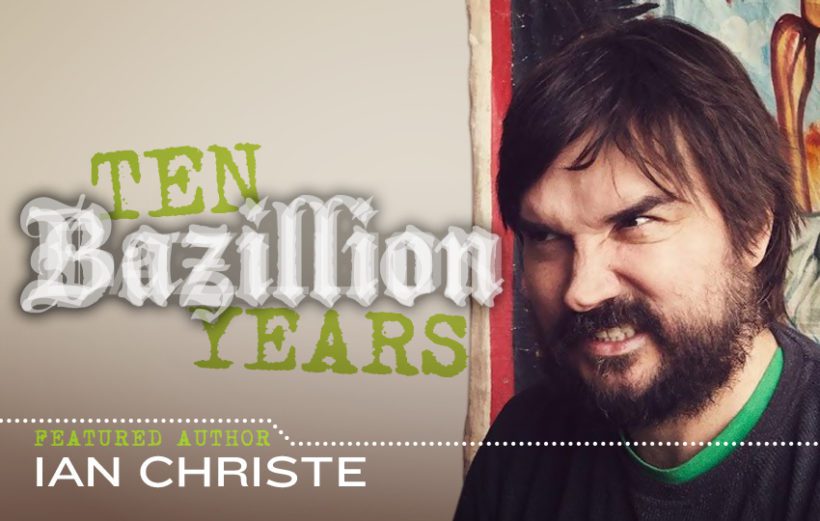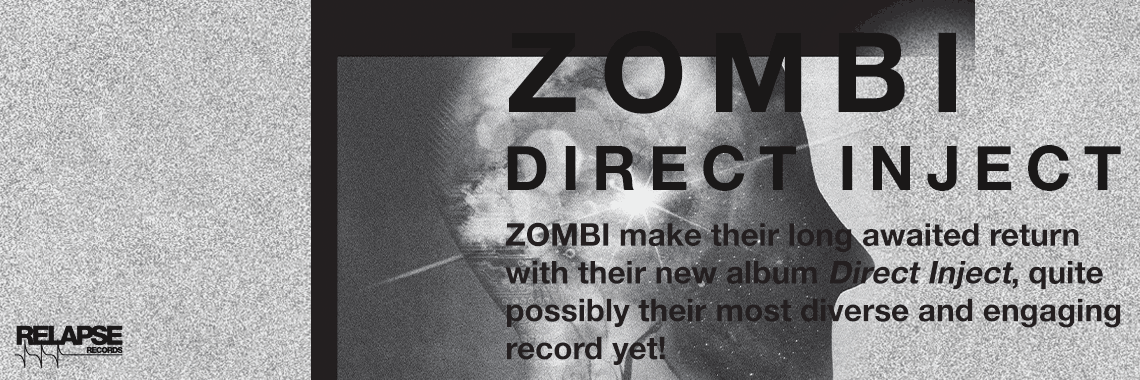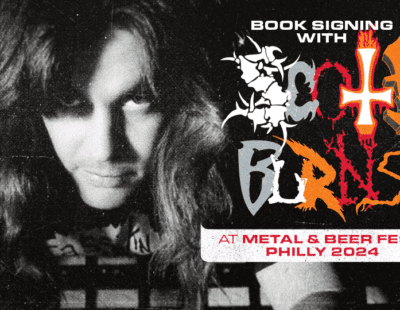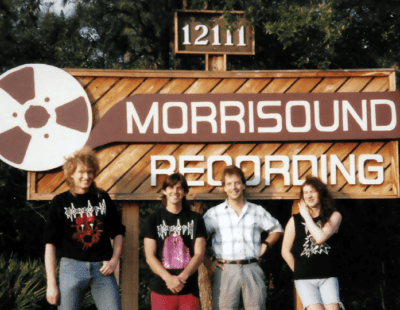
Bazillion Points, the heavy metal publishing house founded by Sound of Beast author Ian Christe, turns 10 this year. To celebrate, Decibel has corralled 10 authors from the BP stable to discuss their own works and what it’s like to part of the world’s heaviest publisher.
Long before Scott Ian was the go-to talking headbanger for VH1 and MTV, Ian Christe was there to provide easily digestible and effortlessly entertaining sound bites for a generation of metalheads who still actually watched cable television. But even before that, Ian established a career as one of the best heavy metal journalists in the U.S., contributing to Spin, Wired, CMJ and Rolling Stone (even before they thought metal was “cool”). Of course, the release of his Sound of the Beast: The Complete Headbanging History of Heavy Metal in 2003 reset the bar for books about metal, a bar which Ian was happy to obliterate with his own Bazillion Points publishing house, launched a few years later. Today we speak with the man who inspired this series, and manages to impart metal wisdom on the masses, despite his distinct lack of dyed facial hair.
You famously released Sound of the Beast in hardcover in 2003. At the risk of talking smack on HarperCollins, who still likely write you royalty checks, was part of the impetus of starting Bazillion Points thinking, “Ah, THIS is how heavy metal books should be treated.”?
Yeah, exactly, I thought I could do it better! Remember the rapper DMX? His book came out the same month as Sound of the Beast, and we had the same editor. I mean he really had that editor wrapped around his finger and I got the crumbs. I think his deal was 30 or 40 times bigger than mine. But I got lucky in that my editor was a smart guy, but he didn’t necessarily want to bruise his brain thinking about a heavy metal book too much, so if I ever asked him about marketing or design or something, he would just put me in touch with the person at HarperCollins doing that job. By the end I got a pretty good education in creating books, in many areas—except for the tiny detail of distribution and what to do when a truck shows up carrying six tons of Swedish Death Metal and the driver asks where my pallet jack is.
Anyway, Sound of the Beast did great for them, it way outsold DMX’s book [Laughs], and I went back to them with a proposal for a book called Birth of the Beast, which would have been a prequel based on all these interviews I did with Dio, Scorpions, Rob Halford, Sabbath, specifically about the 1960s and, in Dio’s case, the 1950s. I mean, he had stories about his band the Rumblers that had to change its name to the Red Caps because kids were showing up with bike chains and two-by-fours to beat on each other after Rebel Without a Cause came out! But nothing doing, HarperCollins wasn’t interested, they wanted more details, they wanted to wait to decide. I had to jump through all the same hoops, even though I had been thinking I’d broken open the door for heavy metal books with Sound of the Beast. No, I was still at square one.
So, I started Bazillion Points simply with books that I wanted to read, like Daniel Ekeroth’s Swedish Death Metal and Andy McCoy’s autobiography. And I knew all these people like Jeff Wagner and Metalion, who were so supremely steeped in metal history, but I knew there would never be an opening for them in corporate publishing back then. So, I started with books I wanted to read, and I made them how I wanted to see them, and it turned out other people were picturing the same thing.
Did you launch Bazillion Points as a full-time endeavor in 2007-2008? Or were you still working other jobs in the early days?
I was still writing for magazines, doing articles about lab-grown meat and moon dust for Popular Mechanics and Wired, and some small writing and on-camera metal things for VH1, plus I started doing my SiriusXM show in 2004. I piece together a living, I’ve been doing that for a long time. But each book pretty much spawned the next, meaning Bazillion Points had momentum from the beginning. If there’s anything interesting at all about my job life, it’s that during 25 years in New York City, I just didn’t need that much to live. I was in my apartment on North 8th St. in Williamsburg for so long, the rent wasn’t crazy, and I never spent money on things like cable, haircuts or cabs. I could always make it work on no budget. I look back and my life in Brooklyn seems like a blur that no longer exists, because that New York is just gone. But I will say that I no longer have choice possessions like ’80s Voivod tour shirts and my test pressing of Seven Churches and a Bathory yellow goat. Those things were all sacrificed to the cause, but happily so. I’m a fundamentalist DIY or die-er. There’s always a way.
The U.S. version of Swedish Death Metal is really what put BP on the map for most people. How did you get hooked up with author Daniel Ekeroth? And please provide your best, succinct, not-terribly-embarrassing Daniel Ekeroth drinking story.
Ha-ha, along with his Violent Italy book, his Swedish Death Metal book had been out for a while, and I wanted to read it, but it cost like $75 with postage. I think he only sold three to the States—one of them to you! I figured there had to be a better way, and somehow that ended up being getting the files from him and figuring what was in all these folders labeled in Swedish over the course of a year.
Swedish Death Metal has been out for 10 years now, and we’ve had a lot of hilarious fun times all over the place. I was living in Switzerland for three years, so I saw him pretty often then. This spring he came down from Sweden, and we decided to go marching around in the mountains. I took him to Grindelwald, telling him there might be a little bit of snow on the top of the hike under the Eiger down to the the next valley. Well, everything was green down below, but there was still twelve feet of snow up top! So, we get up there, two metalheads in black jeans drinking beer and everyone else is on skis. It was hilarious. We had to walk on what was basically a long sledding trail, we’re just staggering along talking about Swedish hardcore in the Alps while people are whizzing past. I’ve made him walk 30 miles in a day before, but at a beer per mile it all works out.
For, oh, pretty much BP’s entire existence now, the “Print is Dead” narrative has been kicked around pretty hard. Of course, the internet has altered the print landscape dramatically in the last decade, but obvious some print is still thriving. How have you managed to keep BP moving forward in such an environment and what’s the biggest obstacle you’ve faced any overcome in the past decade?
Print is not dead at all, I guess it’s like those articles that surface every year or two since 1971 proclaiming that metal is dead. Somebody probably proclaimed print to be dead when the telegraph was invented, you know? The book industry wanted to kill off books and probably itself with ebooks, but that didn’t entirely work. I think social media has been a real threat, it simply consumes so much of people’s attention that there’s nothing left for reading books, listening to music, or exercising decent hygiene. My biggest challenges have always related to the logistics of moving books around the world. They’re heavy as rocks, but more delicate. A full printing of something like METALION weighs 16 actual tons.
I’m granting you the opportunity to hop in the Nocturnus time machine (circa The Key) and take it for spin. But instead of going back in time to kill baby Jesus, you get to go back in time and re-work one Bazillion Points release. Which one is it and what are you going to do to it?
Honestly, every book is worked to my wits’ end, until I have no idea what else to add or do. So aside from tweaking the amount of blue on a cover, or the darkness, or some little nudge, all of which we do anyway in subsequent printings, I’m at a loss. Oh, I know, the Mellodrama DVD documentary, should be a book! Okay, thanks, we’ll put a Mellotron history out in 2019, it’s settled.
Unlike everyone else interviewed for this series, I’m not going to ask you to name your favorite book published on Bazillion Points. Instead, what’s the one book of the past decade you WISH you could have published, but for one reason or another did not?
I got really lucky crossing two of those books off my list in 2016: Your book, Choosing Death, and Eerie Von’s photo book Misery Obscura. If I had started Bazillion Points a couple years earlier, I easily could have ended up releasing Lemmy’s book, White Line Fever, the American rights were sold for an amount like one week’s of the man’s bar tab. For some reason that possibility haunts me, even though it was years before Bazillion Points began. Be sure. I would have pounded on his door for another two hundred pages, and released the book in black leather hardcover, Argh, why am I tormenting myself? Because I think the wit and wisdom of Lemmy could have been a 12-volume set.
When some asks me “When are you gonna write another book?” my first reaction is that I want to punch them. Do you ever the miss long form writing that goes into a book? Are you thinking about punching me right now?
I’m missing a lot doing this, there have been books where I worked 8 a.m. to 6 a.m. several days a month, I guess this is your way of telling me I should relax and take time off from making books to go write one? Maybe, but writing is very lonely, nowadays I’m used to working with great friends like you, Daniel, Brian Lew, Harald, Tom Warrior, Mike McPadden, Tesco. I guess when you guys are ready to team up and design, edit, print, and sell a book that I write, we can release it on the Bizarro Points sub-imprint! I’m really proud of all the books, I will get back to thinking about me-first one day, but right now Bazillion Points is healthy ecosystem and I’m enjoying sitting back and watching the power of these books in action.






